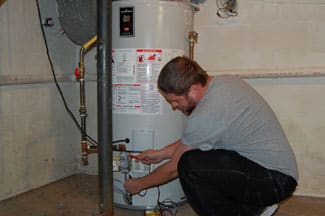Managing Standard Heater Malfunctions
Managing Standard Heater Malfunctions
Blog Article
Every person maintains their own way of thinking on the subject of Water Heater Repair and Troubleshooting.

Visualize beginning your day without your routine warm shower. That already establishes a poor tone for the rest of your day.
Every residence requires a reputable water heater, yet just a few recognize exactly how to manage one. One very easy way to maintain your hot water heater in leading shape is to look for faults on a regular basis as well as fix them as quickly as they appear.
Bear in mind to turn off your water heater before sniffing about for mistakes. These are the water heater mistakes you are more than likely to experience.
Water too hot or too cool
Every water heater has a thermostat that identifies how hot the water obtains. If the water entering your residence is also hot in spite of setting a practical optimum temperature, your thermostat may be damaged.
On the other hand, also cold water might result from a stopped working thermostat, a damaged circuit, or incorrect gas circulation. As an example, if you use a gas hot water heater with a damaged pilot burner, you would obtain cold water, even if the thermostat remains in ideal problem. For electric heating units, a blown fuse may be the perpetrator.
Not nearly enough hot water
Water heaters been available in many sizes, relying on your hot water demands. If you lack warm water before everybody has had a bath, your hot water heater is also little for your family size. You should consider mounting a larger water heater container or choosing a tankless water heater, which takes up much less area and is much more resilient.
Strange sounds
There go to the very least 5 kinds of sounds you can hear from a water heater, yet the most usual interpretation is that it's time for the water heater to retire.
First of all, you ought to know with the normal seems a hot water heater makes. An electric heating unit might appear different from a gas-powered one.
Popping or banging noises normally suggest there is a piece of debris in your containers, and also it's time to cleanse it out. On the other hand, whistling or hissing noises might simply be your valves allowing some stress off.
Water leakages
Leakages might originate from pipes, water links, shutoffs, or in the worst-case circumstance, the storage tank itself. In time, water will wear away the container, and also locate its escape. If this takes place, you require to change your hot water heater immediately.
However, prior to your modification your entire tank, make certain that all pipes remain in area which each valve functions flawlessly. If you still need aid identifying a leakage, call your plumber.
Rust-colored water
Rust-colored water suggests one of your water heater parts is worn away. It could be the anode rod, or the storage tank itself. Your plumber will certainly have the ability to identify which it is.
Lukewarm water
Regardless of how high you established the thermostat, you won't get any kind of hot water out of a heater well past its prime. A water heater's effectiveness might lower with time.
You will certainly additionally get lukewarm water if your pipelines have a cross link. This means that when you switch on a tap, warm water from the heating unit streams in alongside regular, cold water. A cross link is easy to spot. If your hot water taps still follow shutting the water heater shutoffs, you have a cross connection.
Discoloured Water
Rust is a significant root cause of filthy or discoloured water. Corrosion within the water storage tank or a failing anode pole could create this discolouration. The anode rod shields the storage tank from rusting on the within and must be checked yearly. Without a pole or a correctly operating anode pole, the hot water swiftly wears away inside the tank. Get in touch with a specialist water heater specialist to identify if changing the anode pole will certainly fix the problem; otherwise, replace your hot water heater.
Verdict
Ideally, your hot water heater can last 10 years before you need an adjustment. However, after the 10-year mark, you might experience any one of these mistakes a lot more on a regular basis. At this point, you should include a brand-new hot water heater to your spending plan.
How To Troubleshoot 3 Common Water Heater Problems in Twin Cities
The Water Heater Is Leaking
A leaky cold water inlet valve A loose pipe fitting A leaky temperature and pressure relief valve A corroded anode rod A cracked tank Turn Off Your Water Heater:
Shut off your gas water heater by turning the gas valve on the unit to the “OFF” position. Shut off your electric water by switching its power off at your electrical panel. Look for a two-pole breaker labeled “water heater” and turn it to the “OFF” position. Move the ball valve connected to the water heater to be perpendicular to the piping at a 90° angle. Look for the Leak:
Depending on whether the water is coming from the tank's top or bottom, you’ll want to look for the leak in different locations.
If the leak comes from the top of the tank, carefully look for water escaping from the cold water inlet valve or loose pipe fittings. Rusted hot and cold water valves can have loose connections with the tank, with water leaking out of them.
https://mspplumbingheatingair.com/blog/how-to-troubleshoot-3-common-water-heater-problems
I'm certainly very occupied with Water Heaters Problems and I hope you enjoyed the blog posting. If you appreciated our blog post kindly make sure you remember to pass it around. We love reading our article about Water Heater Repair and Troubleshooting.
Resolve fast, contact! Report this page